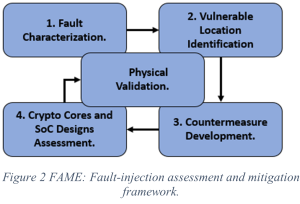ECE Assistant Professor Farimah Farahmandi has received funding from the Office of Naval Research (ONR) in support of her 3-year project, “FAME: Fault-Injection Assessment and Mitigation of Microelectronics at Pre-silicon.” The $600k grant supports work which aims to counter fault-injection attacks by discovering the most vulnerable locations in order to develop more efficient solutions for bolstering physical protection.
With the emergence of the Internet of Things (IoT) and edge computing that promises new and exciting applications from the military, naval, mobile, financial, transportation, and household sectors, security and privacy have emerged as major design challenges. The computing and sensing components in an IoT system, cryptographic hardware in embedded systems, reconfigurable Field Programmable Gate Arrays (FPGA) embedded systems, artificial intelligence (AI) accelerators, digital signal processors (DSPs), and microprocessors are all highly vulnerable to diverse forms of physical and non-physical attacks. These attacks appear in different forms (e.g., information leakage, side-channel leakage, fault injection, physical attacks, rowhammer) and can effectively bypass the security mechanisms built in a design, thus putting systems at risk. Among them, fault-injection attacks have become a major concern to the computer security community primarily due to their powerful capability in tampering with critical features in a device and ability to extract secrets, irrespective of the mathematical strength and robustness of the implemented security mechanisms.

In this project, we try to detect the most vulnerable locations in a design to fault attack and place emphasis on protecting these vulnerable locations so that the countermeasure would be more efficient, and the overhead would be greatly reduced. The end goal of this project is to enable the production of hardware more resilient to various methods of fault-injection at a much more feasible cost.